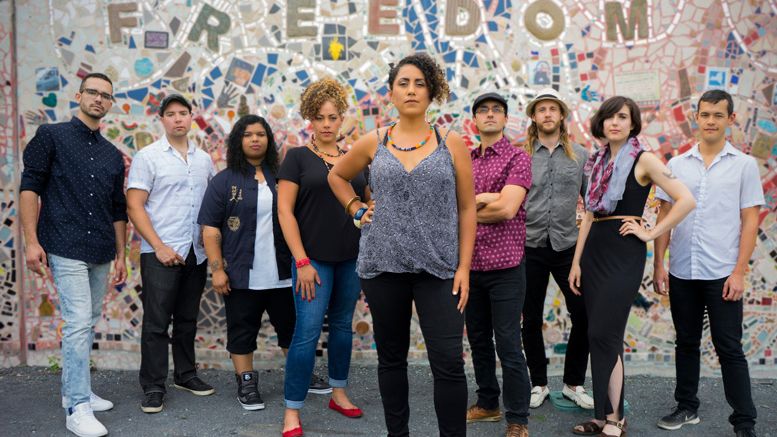By: Al Gentile*/TRT Reporter—
For queer people of color, and many people within the LGBTQ community, few places exist that function as an altogether safe space, political action stage, and inclusive social experience. Evan Greer, a trans woman, accomplished musician, community organizer, and activist, set out to change that more than three years ago.
Break the Chains has been serving that purpose for the LGBTQ community since then. Part political action stage, part social club, and part experiment, the monthly happening has become a well-known catalyst for strength, solidarity, and fun.
“Break the Chains is about tearing down the systems of oppression that divide and hold back the LGBTQ community,” Greer said. “I wanted to create a place where everyone can come together around our common goals of collective liberation and have an amazing time doing it.”
For Greer, the inspiration is personal. As a professional queer musician and activist, she said Break the Chains was both a way to strengthen the community of LGBTQ people and give back to queer artists.
“I’ve spent years working as a touring queer artist working to support my family with music and activism, and I know how hard that can be. I’ve gotten so much love from Boston’s queer community, and I wanted to give back by creating a consistent, solid paying gig for local and touring LGBTQ artists,” Greer said.
Community through art, intent, and passion
Since its inception, Break the Chains has kept the doors open for all. As an all-ages event, LGBTQ youth and people of color have their own place amid a landscape of predominantly 21+ venues.
Filling that space is part and parcel of the mission of Break the Chains, according to Greer.
“Boston is one of the fastest gentrifying cities in the country, which has always made it challenging for marginalized communities to maintain consistent spaces and events,” Greer said. “So many LGBTQ events happen at 21+ bars and clubs, which excludes many members of our community.”
Yet “all-ages” typically connotes an event geared specifically to youth. Liza Behrendt, an attendee of several events, said the all-ages status has attracted people from all age brackets.
“I particularly appreciate that Break The Chains is all-ages, since we so rarely party in intergenerational settings. It’s great to share music with my peers but also with parents, children, students, and older people,” Behrendt said.
Prominent New York riot grrrl punk group “The Shondes” is a mainstay at Break the Chains. Eli Oberman, violinist for the band, said younger crowds bring their own special energy to the event.
“It always feels very vibrant and queer, and I especially appreciate that it’s all ages. Having young people there feels really special,” Oberman said.
Kiara Vincent, a queer person who has also attended in the past, said Break the Chains at-large represents inclusivity and activism.
For Vincent, the diversity of talent, affordability, accessibility, and an atmosphere promoting respect make Break the Chains a truly queer-friendly space.
“For me, Break the Chains is in every way possible what happens when you take a party and you make it queer,” Vincent said. “It’s not made queer simply by the people who attend, though that is a big factor. Break the Chains is an acknowledgment that we all need a place to let loose, decompress and dance while also keeping the sometimes predatory culture often associated with clubbing at bay.”
Attracting LGBTQ youth and people of color through art, music, and activism is building progress for these communities, according to Behrendt.
“Queer people need to build [their] own spaces, and if you ask me, those spaces should be structured with anti-oppression principles in mind,” Behrendt said. “Dance parties are no different. That’s why I appreciate that Evan makes space for us to dance and to organize against queerphobia, transphobia, racism, and other forms of violence.”
As a stage for trans, queer, and multiracial artists from all over, Break the Chains has become, in many ways, a second home for touring musicians.
Taína Asili, an activist and bandleader for the Afro-Latin and reggae rock group “Taína Asili y la Banda Rebelde”, performed at the Break the Chains event four times over the last two years.
Having adopted Boston as her second home—she hails from Albany, New York—Asili said after her time performing across the country, this event makes Boston’s queer community a catalyst for something new.
“I travel with my music all over the country, and I can tell you that this is just not something you can find anywhere,” Asili said. “It’s really special, which is one of the reasons why Evan and I have taken Break the Chains on the road before, working with queer folks and organizations to organize performances from Brooklyn, New York to Olympia, Washington, and even a tour through Europe.”
Oberman said the event is a sounding board for their politically charged message, abrasive and energetic sound, and important lessons for the LGBTQ community.
“I remember once Evan put up some signs reminding people about the importance of consent … it was the kind of thing that actually invited you to reflect and not just be dogmatic, and it was posted on the inside of the (single) bathroom door … like, the single bathroom is this place sort of outside of the fray of the party, and by putting it there it really did give me the space to genuinely reflect for a minute before going back out there.”
That feeling of transparency, freedom, and respect are a major part of why Asili considers Break the Chains an important stop on her travels around the country.
“My favorite part about performing at these parties is the feeling that I can bring my whole self to my performance, including my queer woman of color punk self,” she said. “I can be free in my song choices and the ways I choose to perform them, because people are so open [to] a lot of musical styles. I can be free to jump in and dance with [the] audience, and I can be free [to] talk, sing or scream about any issue that is resting on my heart.”
In 2016, Break the Chains was named 2016’s “Best Dance Party” by the Improper Bostonian. This honor, Greer said, signaled a vindication of the space queer people inhabit in the city.
Yet, Greer remains humble, regardless of her work.
“[That] award doesn’t belong to me, but to all the amazing queer people that make Boston an awesome place to be yourself,” Greer said. “We are shaping the future and changing the world around us, and the fact that an explicitly radical, anti-racist, anti-assimilationist queer event organized by a trans woman can win an award like this is a testimony to that.”
From humble beginnings as a simple house party, the event has grown to regularly fill Make Shift Boston, an important creative hub and event venue in the city.
For Vincent, the reason she attends boils down to a simple question of a desire to connect.
“Go, just go. Don’t have friends? Don’t think you’ll like it or the crowd? Go, it’s worth it.”
*TRT Assistant Editor Mike Givens contributed to this story.
[This story originally ran on the Nov. 2, 2017 issue of TRT].







